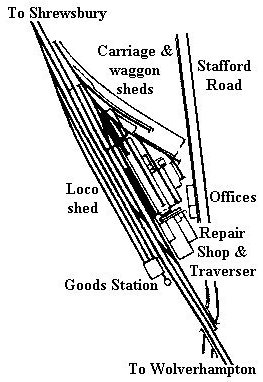Beginnings
The Shrewsbury & Birmingham
Railway (S&B) originally planned a route from Shrewsbury to Birmingham,
via Wolverhampton High Level Station and the Stour Valley Line. The
Stour Valley Line
was originally known as the Birmingham, Wolverhampton & Stour Valley
Railway, its construction was authorised by an Act of Parliament passed
on 3rd August 1846. The capital was equally divided between four
sources; the company itself, the Shrewsbury & Birmingham Railway, the
Birmingham Canal Company, and local interests. The London & North
Western Railway (L&NWR) was always hostile to the S&B and they soon
managed to gain control of the Stour Valley Line. This was done in three
steps:
1) The L&NWR took
over the Birmingham Canal Company.
2) The L&NWR leased
the line under the terms of an Act passed on 1st July 1847 that would
prevent the Shrewsbury & Birmingham from using the line if they joined
the Great Western Railway, which was an intense rival.
3) By making the Wolverhampton General station (High
Level) and the section to Bushbury joint property with the Shrewsbury &
Birmingham in an Act of 9th July 1847, which also gave the S&B running
powers over the Stour Valley Line.
|

Stafford Road Works as originally built. |
The S&B realised that
it could not reach Birmingham as planned and so it decided to build
its headquarters and repair shop at Wolverhampton. The buildings had
to be situated close to the railway and preferably close to the town
centre. The only suitable site that could be found was in between
the railway and the Stafford Road, about three quarters of a mile
from the town centre.
The land was purchased by the company's
architect Mr. Edward Banks, who designed the buildings.
Construction
began in July 1849, and was completed in November of that year at
about the time of the railway's opening. The offices were built
along the Stafford Road and behind them was the locomotive shed,
carriage and wagon shed, the repair shops and traverser, and a goods
shed. The new site was known as Stafford Road works. |
On 1st September 1854 the
S&B amalgamated with the Shrewsbury & Chester Railway, and the Great
Western Railway (GWR), to become the Northern Division of the GWR. The
lines to the north of Wolverhampton were standard gauge whereas the
lines to the south were broad gauge. This meant that the works had to
cater for both gauges.
The original layout as
planned by the S&B was designed for the stabling and repair of rolling
stock. The company purchased locomotives, vehicles, and spare parts as
required, and so the works had only a very limited facilities for making
and reconditioning parts. These facilities would now have to be improved
to cater for the larger number of locomotives and rolling stock that
were used on the line. The GWR
decided to retain the existing buildings and machinery, and adapt them
for both broad gauge and standard gauge use. This would be the only
locomotive works in the Northern Division. The carriage and waggon dept.
was moved to Saltney, and extra machinery was brought from Shrewsbury.
The Northern Division stores was also to be located here.

|
|

|
|
 |
|

|
|
Exit |
|
Return to
Blue Plaques |
|
Return to the locomotives menu |
|
Continue |
|



